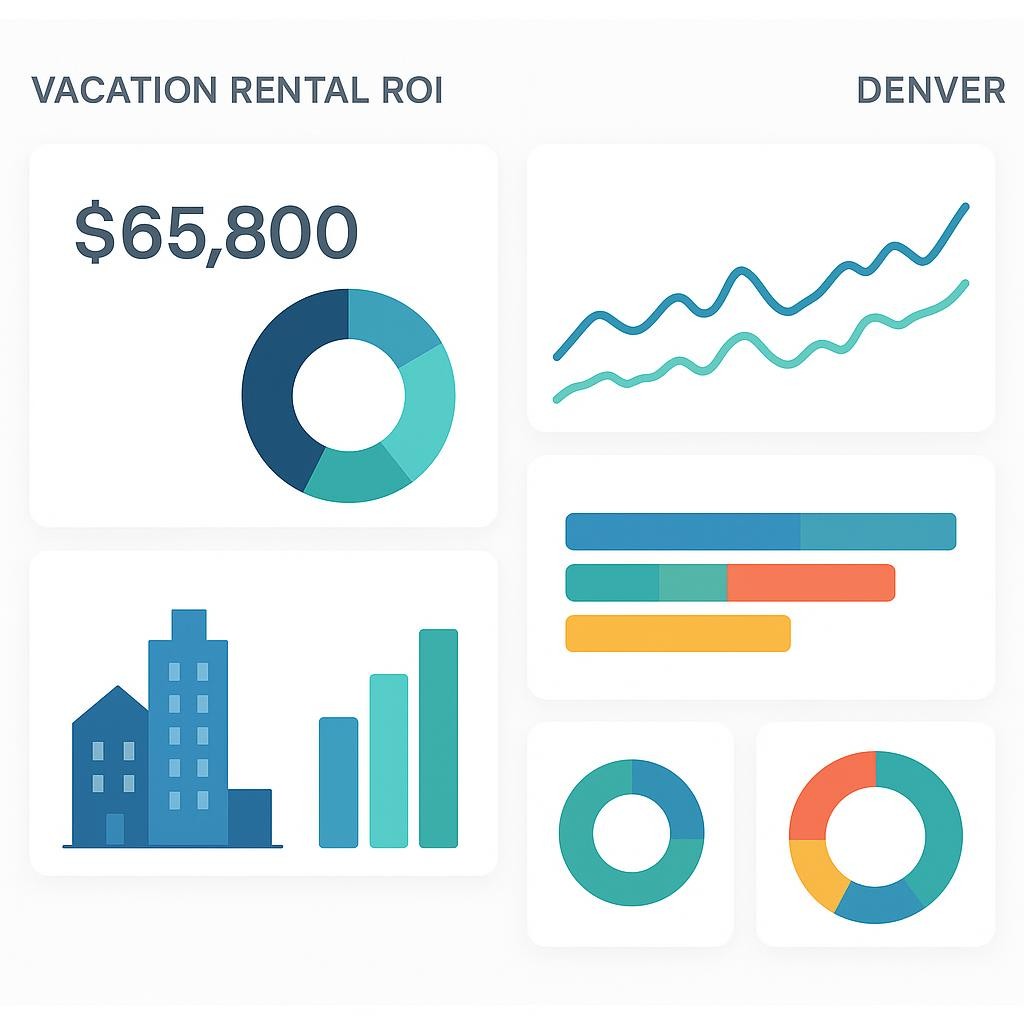Denver Vacation Rental Investment Guide: Market Opportunities and ROI Strategies for 2025

Denver Market Overview: Investment Climate and Economic Drivers
Denver has emerged as a prime destination for vacation rental investments, driven by a robust economy and sustained tourism demand. The city's strategic location as a gateway to Colorado's outdoor recreation opportunities, combined with a thriving tech and healthcare sector, creates an ideal environment for short-term rental success.
The Denver rental market maintains exceptional stability with occupancy rates reaching approximately 94.3% in Q4 2024, demonstrating consistent demand despite nearly 20,000 new apartment units entering the market. This resilience reflects Denver's diverse economic base, attracting professionals in technology, healthcare, and education sectors who drive both long-term residency and business travel demand.
Key economic drivers supporting vacation rental investment include Denver's proximity to world-class ski resorts, national parks, and year-round outdoor activities. The city serves as a base camp for visitors exploring Colorado's recreational offerings, while downtown Denver's cultural attractions and vibrant dining scene appeal to urban tourists. Additionally, Denver International Airport's status as a major hub facilitates consistent visitor traffic from across the United States and internationally.
Investment climate indicators show moderate rental price growth of 2-3% in 2025, signaling market maturation rather than volatility. This stabilization creates predictable revenue projections for investors, while the city's continued population growth and job creation maintain underlying demand fundamentals essential for sustainable vacation rental performance.
Financial Performance: ROI Potential and Revenue Expectations

Denver vacation rental investments typically generate ROI returns between 8-12%, positioning the market competitively within Colorado's investment landscape. Current market data indicates short-term rentals achieve approximately 8.08% yield, supported by average daily rates near $196.60 and occupancy rates around 63% for vacation rental properties.
Revenue optimization strategies focus on strategic pricing during peak seasons when Denver's tourism influx drives higher daily rates. Properties in prime neighborhoods like LoDo (Lower Downtown) or Cherry Creek command premium rates exceeding $250 per night during ski season and summer festival periods, while maintaining strong occupancy through Denver's year-round appeal.
The Colorado vacation rental market demonstrates that professionally managed properties achieve significantly higher performance than self-managed units. Professional management typically improves occupancy rates by 15-20% through optimized pricing strategies, superior guest experience, and streamlined operations that maximize revenue potential.
Investment performance factors include property location, amenities, and management quality. Properties within walking distance of downtown attractions or offering mountain views consistently outperform suburban locations. Essential amenities like high-speed internet, parking, and modern appliances directly correlate with guest satisfaction scores and repeat bookings, ultimately driving stronger financial returns for Denver vacation rental investors.
Cost considerations include property acquisition, renovation to vacation rental standards, and ongoing operational expenses. Successful investors typically allocate 15-25% of gross revenue toward professional management, cleaning, maintenance, and marketing to ensure optimal performance and guest satisfaction in Denver's competitive vacation rental market.
Regulatory Landscape: Navigating Denver's STR Laws and Requirements
Understanding Denver's short-term rental regulations is crucial for successful vacation rental investment. The city requires STR operators to obtain proper permits and register with municipal authorities, while zoning restrictions limit where vacation rentals can operate legally within city boundaries.
Permit requirements include business license registration, payment of applicable hotel occupancy taxes, and compliance with zoning ordinances that vary by neighborhood. Many areas have specific restrictions on STR operations, and some homeowners associations impose additional limitations that investors must research before property acquisition.
Recent regulatory trends show Denver tightening STR rules to balance neighborhood concerns with tourism benefits. Some areas require owner-occupancy or limit the total number of vacation rentals permitted within specific zones. These evolving regulations emphasize the importance of thorough due diligence and legal consultation before investing in Denver vacation rental properties.
Compliance strategies include working with local attorneys specializing in vacation rental law, maintaining detailed records of all rental activities, and ensuring property insurance covers short-term rental operations. Professional property management companies often handle regulatory compliance as part of their services, reducing investor burden while ensuring adherence to all applicable laws.
Tax obligations extend beyond standard property taxes to include short-term rental tax collection and remittance to appropriate authorities. Denver requires vacation rental operators to collect and pay city occupancy taxes, similar to hotels, making accurate financial tracking and reporting essential for legal compliance and optimal tax planning.
Seasonal Demand Patterns: Maximizing Occupancy Year-Round

Denver's vacation rental market experiences distinct seasonal patterns that savvy investors leverage for maximum profitability. Peak demand occurs during ski season (December-March) when visitors use Denver as a base for accessing Colorado's mountain resorts, and summer months (June-September) when outdoor activities and festivals drive tourism.
Winter season strategy focuses on positioning properties as convenient alternatives to expensive mountain lodging, offering guests urban amenities with easy access to ski areas. Properties emphasizing ski equipment storage, early check-ins for powder days, and mountain gear recommendations consistently achieve higher winter occupancy and daily rates.
Summer demand centers on Denver's outdoor recreation access and cultural events like the Denver County Fair, Great American Beer Festival, and numerous music festivals. Vacation rentals highlighting hiking trail access, bike storage, and downtown proximity capitalize on this seasonal influx while maintaining strong occupancy through fall.
Year-round optimization requires understanding Denver's diverse visitor demographics. Business travelers provide steady mid-week demand, while leisure tourists drive weekend occupancy. Properties offering flexible amenities suitable for both business and leisure guests maximize booking potential across all seasons and visitor types.
Spring and fall represent shoulder seasons with moderate demand but opportunities for strategic pricing. These periods often attract visitors seeking fewer crowds and mild weather for outdoor activities. Successful investors adjust pricing strategies seasonally while maintaining property standards that appeal to Denver's year-round vacation rental demand.
Location Strategy: Best Neighborhoods for Vacation Rental Investment
Neighborhood selection significantly impacts vacation rental investment success in Denver's diverse market. Prime areas like LoDo (Lower Downtown) offer proximity to major attractions, restaurants, and nightlife, commanding premium daily rates while maintaining high occupancy through consistent urban tourism demand.
Capitol Hill attracts younger demographics seeking Denver's cultural scene and nightlife, while Cherry Creek appeals to upscale travelers preferring luxury shopping and dining. Each neighborhood serves different guest preferences, requiring investors to match property characteristics with target market demographics for optimal performance.
Emerging neighborhoods like RiNo (River North Art District) and Highlands present opportunities for investors seeking value appreciation alongside rental income. These areas offer lower acquisition costs while benefiting from ongoing development and increasing visitor interest in Denver's evolving cultural landscape.
Mountain view properties command premium pricing regardless of specific neighborhood, as Colorado's scenic beauty remains a primary draw for vacation rental guests. Properties offering unobstructed mountain vistas or easy access to outdoor recreation consistently outperform comparable units without these features.
Transportation accessibility influences location desirability, with properties near light rail stations or major highways offering convenience for airport transfers and regional exploration. Investors should consider guest logistics when evaluating potential vacation rental locations, as ease of access directly correlates with booking frequency and guest satisfaction in Denver's vacation rental market.
Investment Success Framework: Risk Management and Optimization Tips
Successful vacation rental investment requires comprehensive risk management and strategic optimization across multiple operational areas. Property insurance specifically covering short-term rentals protects against liability and property damage risks inherent in vacation rental operations, while emergency fund reserves handle unexpected maintenance and market fluctuations.
Market diversification strategies include considering multiple property types and neighborhoods within Denver's vacation rental market. Investors often balance high-yield urban properties with stable suburban rentals, creating portfolio resilience against localized market changes or regulatory shifts affecting specific areas.
Technology integration streamlines operations while improving guest experience through automated check-in systems, smart home features, and professional photography showcasing property amenities. These investments typically generate immediate ROI through increased booking rates and reduced operational overhead.
Performance monitoring involves tracking key metrics like occupancy rates, average daily rates, guest satisfaction scores, and total revenue per available room (RevPAR). Regular analysis enables data-driven decisions about pricing adjustments, property improvements, and marketing strategies that optimize Denver vacation rental investment returns.
Professional partnerships with experienced property managers, cleaning services, and maintenance contractors ensure consistent property standards while freeing investors to focus on portfolio growth. The 15-25% management fee typically generates positive ROI through improved occupancy, pricing optimization, and operational efficiency that individual investors struggle to achieve independently.
Conclusion
Denver's vacation rental investment market offers compelling opportunities for investors seeking stable returns in a growing tourism destination. With ROI potential ranging from 8-12% and strong underlying economic fundamentals, the market provides attractive income generation alongside long-term appreciation potential.
Success requires strategic property selection in prime neighborhoods, thorough understanding of regulatory requirements, and professional management to optimize performance. The city's year-round appeal, from ski season access to summer festivals, creates diverse revenue opportunities for well-positioned vacation rental investments.
Key success factors include choosing properties with mountain views or downtown proximity, ensuring regulatory compliance, and implementing professional management systems that maximize occupancy and guest satisfaction. Denver's stable rental market, combined with Colorado's tourism growth, positions vacation rental investments for sustained profitability.
Investors should focus on comprehensive due diligence, understanding seasonal demand patterns, and building relationships with local service providers who understand Denver's unique vacation rental market dynamics. With proper planning and execution, Denver vacation rental investments can generate consistent returns while benefiting from the city's continued growth as a premier destination for business and leisure travelers.
